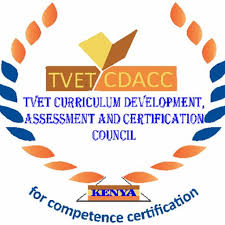Overview

The Curriculum Development, Assessment and Certification Council (CDACC) was established under the Technical and Vocational Education and Training (TVET) Act, 2013 and began operations in 2015. It is responsible for developing and reviewing curricula for technical and vocational education, ensuring they align with industry standards and national development needs. The Council also oversees the assessment of student competencies and issues certification for various training programs. CDACC plays a critical role in enhancing the quality of TVET in Kenya by ensuring that training meets both local and international market demands.
CEO: Prof. Kisilu Kitainge
Prof. Kisilu M. Kitainge holds a Ph.D. in Applied Learning (TVET) from RMIT University, Australia, and a Master of Philosophy in Educational Psychology from Moi University. He has extensive academic experience, having served as an Associate Professor, Dean, and Director at the University of Eldoret and other institutions.

Management Team

Prof. Kisilu Kitainge
CEO

Hellen Murithi
Director Corporate Services

Dr. Sella Terrie Kisaka
Deputy Director CRAMD/Assessment

Dr. Osumbah Beatrice Amondi
Deputy Director, Curriculum Development
Board of Governors

Prof. Ahmed Ferej
Chairperson

Dr. Esther Thaara Muoria
P.S, of the State Department TVET

Prof. Kisilu Kitainge
CEO/Council Secretary

David Mwangi
Experienced Education Expert

Nyamai Wambua
Landscape Architect and an International Labour Organization

Florence Suji
Manager, Toyota Kenya Academy

Dr. Joseph Kaberia Arimba
General Legal Practitioner at Kaberia Arimba & Company Advocates

Loice Chelagat Kutoh
Principal, Rift Valley Technical and Training Institute

Dr. Kipkirui Langat
Director General of TVET Authority

Dr. Mercy Wanjiru Mwaniki
Technical University of Kenya
Functions
- Curriculum Development: CDACC is responsible for designing, reviewing, and updating curricula for technical and vocational education and training (TVET) programs. The curricula must meet the skills demand of various sectors, aligning with national development goals and industry standards.
- Standards Setting: It sets the required standards for TVET curricula, assessment methods, and certifications. This ensures that training programs offered by institutions maintain high-quality benchmarks that are both locally and internationally recognized.
- Assessment and Certification: CDACC manages the process of evaluating learners’ competencies. It designs and oversees assessments for TVET programs and certifies individuals who meet the required standards, ensuring that certificates are recognized by employers.
- Program Approval: The Council evaluates and approves TVET training programs, ensuring that they are of high quality and relevant to the current needs of the job market. Only accredited programs are allowed to operate within recognized institutions.
- National Framework Alignment: CDACC ensures that all curricula and qualifications are aligned with the Kenya National Qualifications Framework (KNQF). It also ensures compatibility with global best practices, facilitating recognition of qualifications both locally and internationally.
- Research and Innovation: The Council is tasked with conducting research to stay ahead of emerging trends in various industries. It ensures that curricula reflect advancements in technology and skills required in a rapidly changing labor market.
- Quality Assurance: CDACC continuously monitors TVET institutions to ensure that they adhere to approved standards and deliver training programs that meet quality expectations. It conducts audits and assessments to maintain consistency in the quality of education.
- Trainer Support: It provides professional development programs for trainers and assessors to ensure that they are up-to-date with the latest teaching methods and assessment tools. This enables trainers to effectively deliver competency-based training.
- Policy Development: CDACC plays a key advisory role to the government on matters related to TVET curriculum development, assessment processes, and certification systems. It helps shape policies aimed at improving the quality of education and training in Kenya.
- Public Awareness: The Council is actively involved in raising awareness about the importance and value of TVET programs and certifications. It works to enhance the perception of TVET as a pathway to employment, self-employment, and economic growth, helping to improve the overall recognition of technical qualifications.
Important Links
Address & Contacts
- P.O Box 15745-00100, Nairobi.
- Absa Towers, 10th Floor, Loita Street
- info@tvetcdacc.go.ke | cdacc.tvet@gmail.com
- 0758037608